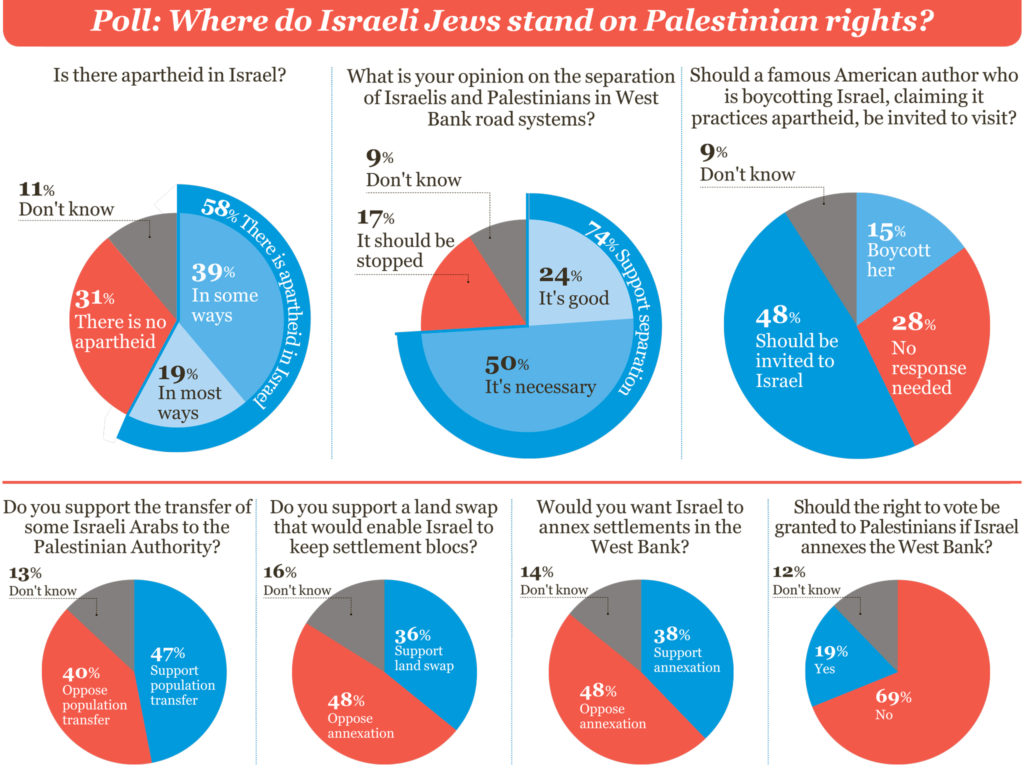UPDATES
Haaretz issues clarification on controversial poll articles
October 29, 2012 | Sharyn Mittelman

Last week AIJAC published a blog post, taking a critical look at Gideon Levy’s article in Haaretz which published a report on a very misleading poll with the original title “Survey: Most Israeli Jews would support apartheid regime in Israel”.
Haaretz has now published a clarification in the print edition of its newspaper in Hebrew regretting the title of Levy’s report. Further, in a new article Levy himself admits that the headline of the report was “misleading”, and apologises for an incorrect claim in his analysis of the poll, in his attempt to “fix a few mistakes”.
An English translation of the Haaretz clarification reads:
“The phrasing of the head title, ‘Most Israelis support Apartheid regime in the country’ (“Ha’aretz” 23.10), did not accurately reflect the findings of the ‘Dialog’ poll. The question to which most of the participants of the poll sample responded negatively was not in regards to the current situation, but rather to a hypothetical situation in the future: “If Israel would annex Judea and Samaria, in your opinion should 2.5 million Palestinians be granted the tight to vote for the Knesset?”
Today Levy’s latest article in Haaretz “Errors and omissions excepted” acknowledges that mistakes were made in his report and analysis on the poll. He writes:
“This article is meant to fix a few mistakes. They shouldn’t have happened; we must acknowledge them, apologize for them and fix them. They were not made intentionally, but as a result of neglect due to time pressure…The Hebrew headline of the news article describing the survey results (‘Most Israelis support an apartheid regime in Israel’) was misleading. Most Israelis do support apartheid, but only if the occupied territories are annexed; and most Israelis oppose such annexation. Haaretz explained this in a clarification published in the Hebrew edition on Sunday…
In my analysis of the survey, which appeared as a separate article, there was a single sentence that did not accurately represent the poll results and contradicted what I had written in the news piece a short time beforehand. My sin was to write: ‘The majority doesn’t want Arabs to vote for the Knesset, Arab neighbors at home or Arab students at school.’ The truth, as I wrote in the news piece, is different: ‘Just’ 33 percent of the respondents said they don’t want Arabs to vote in parliamentary elections, ‘just’ 42 percent wouldn’t want an Arab neighbor, and about the same proportion said it would bother them if there were an Arab student in their child’s class. Not a majority – just a (large ) portion of Israelis espouse these frightening views.”
Despite the clarification and Levy’s admission that mistakes were made, Levy’s article and its headline have already travelled the world.
However, to Haaretz‘s credit it has also published an article critical of Levy’s analysis of the poll, by former Israeli Minister Yehuda Ben Meir, titled “Most of us don’t want apartheid”. Ben Meir digs into Levy’s article:
“Let’s begin with the headline; its dramatic effect is in direct proportion to its misleading information. There is no basis in the data for maintaining that most Israelis support an ‘apartheid regime’ in Israel. In fact, in the article, the small print, the sensational conclusion is restricted by the words: ‘If it [Israel] annexes the territories.’ But even after the correction, the conclusion is mistaken and misleading. That’s because it’s based on the fact that 69 percent said they opposed granting the right to vote to the Palestinians if the West Bank were annexed.
But this finding must be examined in light of the fact that according to the survey, most Israeli Jews oppose annexing the territories. In response to the question ‘Would you want Israel to annex the territories with settlements in them?’ (and note, it does not refer to the territories but only to those “with settlements in them” ), 48 percent said they opposed annexation, while 33 percent supported it.
But here’s the thing: Most Israeli Jews really do object, and rightly so, to letting the 2.5 million Arabs in the territories vote in Knesset elections, because that means the end of Israel as a Jewish state and the end of the Zionist dream. But the same majority is also unwilling to live in a country with an ‘apartheid regime,’ so it opposes the annexation of territories. That’s the survey’s most important finding, and its conclusion is exactly the opposite of what’s written in the article’s headline…
There’s a lot of room for improvement in Israeli society, but this article does an injustice to the State of Israel, the Jewish people and the truth.”
Sharyn Mittelman
Tags: Israel





